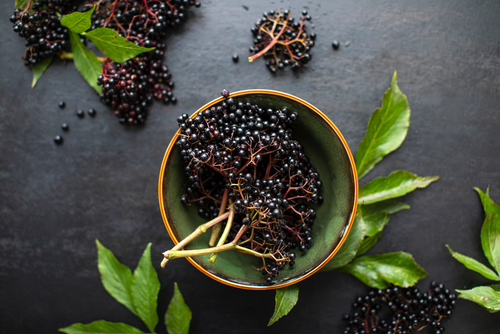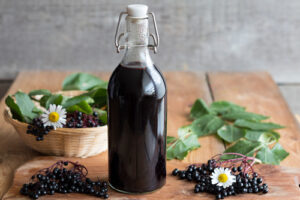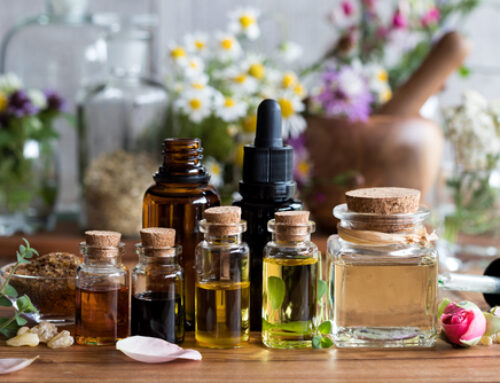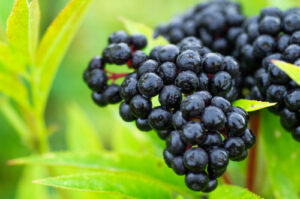 Elderberry syrup is a natural remedy derived from the fruit of the elderberry plant (Sambucus nigra). This syrup is renowned for its potential health benefits, particularly in supporting the immune system due to its rich concentration of vitamins, minerals, and antioxidants. It’s commonly used to help alleviate cold and flu symptoms, reduce inflammation, and provide antioxidant support. There have even been some recent research studies demonstrating how effective elderberry syrup is for your immune system.
Elderberry syrup is a natural remedy derived from the fruit of the elderberry plant (Sambucus nigra). This syrup is renowned for its potential health benefits, particularly in supporting the immune system due to its rich concentration of vitamins, minerals, and antioxidants. It’s commonly used to help alleviate cold and flu symptoms, reduce inflammation, and provide antioxidant support. There have even been some recent research studies demonstrating how effective elderberry syrup is for your immune system.
Natural remedies play a significant role in healthcare. Natural remedies have been used for centuries in various cultures worldwide, showcasing their historical effectiveness in treating ailments and promoting wellness. They often draw from traditional knowledge passed down through generations. Elderberry syrup, like many other natural remedies, tends to have fewer side effects compared to synthetic medications. This aspect makes it appealing to individuals seeking gentler alternatives and who want to focus on holistic health, addressing not just symptoms but also the overall well-being of an individual.
Elderberries are packed with various essential nutrients and bioactive compounds that contribute to their potential health benefits. Here’s an overview of elderberries’ nutritional content:
- Vitamins: Elderberries are rich in vitamins, especially vitamin C and vitamin A. Vitamin C is known for its immune-boosting properties, while vitamin A supports vision, skin health, and immune function.
- Dietary Fiber: Elderberries contain dietary fiber, which aids in digestion, promotes gut health, regulates blood sugar levels, supports a healthy gut microbiome, and may help prevent constipation.
- Antioxidants: These berries are abundant in antioxidants, such as flavanols, anthocyanins, and phenolic acids. These compounds help neutralize harmful free radicals in the body, reducing oxidative stress and inflammation.
- Minerals: Elderberries contain essential minerals like potassium, which is vital for heart health and maintaining proper blood pressure levels.
- Protein and Fatty Acids: While present in smaller amounts, elderberries also contain some protein and beneficial fatty acids.
The combination of these nutrients and bioactive compounds in elderberries is believed to contribute to their potential health-promoting properties, including immune system support, reducing the duration and severity of colds and flu, combating inflammation, and providing antioxidant benefits.
The nutrients present in elderberries offer several health benefits due to their rich composition of vitamins, antioxidants, and other bioactive compounds:
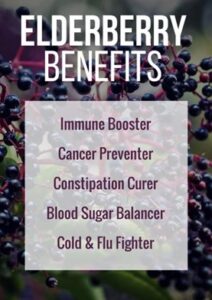 Immune System Support: Elderberries are notably high in vitamin C, which plays a crucial role in supporting the immune system. This vitamin helps stimulate the production of white blood cells, enhancing the body’s defense against infections and illnesses. Some studies indicate that elderberries may modulate the immune response by stimulating immune cells and cytokine production. Cytokines are proteins involved in signaling and regulating the immune response helping to reduce excessive inflammation.
Immune System Support: Elderberries are notably high in vitamin C, which plays a crucial role in supporting the immune system. This vitamin helps stimulate the production of white blood cells, enhancing the body’s defense against infections and illnesses. Some studies indicate that elderberries may modulate the immune response by stimulating immune cells and cytokine production. Cytokines are proteins involved in signaling and regulating the immune response helping to reduce excessive inflammation.
- Antioxidant Properties: Elderberries contain various antioxidants like flavonoids (quercetin and rutin), anthocyanins, and phenolic acids. These antioxidants help combat oxidative stress by neutralizing free radicals in the body. This action may lower the risk of chronic diseases, reduce inflammation, and promote overall health. A study published in the Journal of Agricultural and Food Chemistry demonstrated that elderberry extract increased immune boosting cytokines that scavenge free radicals. It also showed how the antioxidants in elderberries reduce oxidative stress, which can otherwise lead to cellular damage and inflammation.
- Cold and Flu Relief: Research suggests that elderberry may help reduce the severity and duration of colds and flu. Compounds in elderberries may inhibit the replication of viruses, potentially alleviating symptoms and shortening the duration of respiratory infections.
The Research Says:
A double-blind, placebo-controlled trial published in the Journal of International Medical Research showed that participants who took elderberry syrup experienced shorter duration and milder symptoms of the flu compared to the control group. The study found that elderberry extract could effectively inhibit the influenza virus’s replication in vitro. This study involved 60 participants with flu-like symptoms. Those who received elderberry syrup experienced significant improvement in symptoms four days earlier on average compared to the placebo group.
A systematic review and meta-analysis published in the journal Complementary Therapies in Medicine analyzed several clinical trials. It concluded that elderberry supplementation significantly reduced the duration of cold symptoms compared to a placebo when taken within the first 48 hours of symptom onset. However, more high-quality trials were recommended to confirm these findings.
A study published in Nutrients investigated elderberry’s effects on respiratory symptoms in air travelers. Participants taking elderberry extract experienced a significant reduction in cold duration and severity compared to the placebo group.
These studies suggest that elderberry supplementation, particularly when taken at the onset of symptoms, may help reduce the duration and severity of colds and flu. However, while the results are promising, more robust clinical trials with larger sample sizes are necessary to further validate the effectiveness of elderberry in mitigating cold and flu symptoms.
- Heart Health: The potassium content in elderberries may contribute to heart health by helping regulate blood pressure. Additionally, the antioxidants found in elderberries may have a positive effect on cardiovascular health by reducing inflammation and oxidative stress.
- Potential Anti-Cancer Properties: Some studies suggest that elderberry’s antioxidant properties may have a role in preventing the growth and spread of cancer cells, although further research is needed to establish conclusive evidence.
- Skin Health: The vitamin A content in elderberries contributes to skin health, promoting cell turnover and helping maintain healthy skin.
- Inhibition of Inflammation: Compounds found in elderberries have been studied for their potential to modulate inflammatory pathways in the body. For instance, studies suggest that elderberry extract can inhibit certain enzymes and signaling molecules involved in triggering and sustaining inflammation. This inhibition helps mitigate the production of pro-inflammatory substances, thereby reducing the inflammatory response.
These health benefits collectively make elderberries and elderberry-derived products, like syrup, a popular natural remedy for boosting immunity, managing cold and flu symptoms, and supporting overall health. However, while elderberry offers numerous potential benefits, it’s essential to use elderberry products safely, as improper consumption can lead to adverse effects. Consuming them raw or without proper preparation can be toxic, as the seeds, stems, and leaves of the elderberry plant contain cyanide-inducing glycosides. Cooking elderberries properly or using them in commercially prepared products like elderberry syrup eliminates this risk, making them safe for consumption. Always ensure that elderberry products are sourced from reputable sources and follow recommended usage guidelines.
There are various ways to consume elderberries, each offering its own unique benefits. Some common methods include:
- Elderberry Syrup: One of the most popular and convenient ways to consume elderberries is through elderberry syrup. It’s made by cooking elderberries with water and sweeteners like honey or sugar. Elderberry syrup is known for its potential immune-boosting properties and is often taken by the spoonful as a natural remedy for colds and flu.
The syrup that our office produces uses elderberries, cinnamon, apple cider vinegar, lemon zest, local honey and other immune boosting ingredients to supercharge the benefits of our elderberry syrup. It has a great taste and is made fresh weekly.
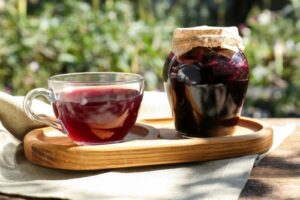 Elderberry Tea: Elderberry tea is made by steeping dried elderberries, dissolving elderberry syrup in hot water, or steeping elderberry tea bags in hot water. It’s a soothing way to enjoy the benefits of elderberries.
Elderberry Tea: Elderberry tea is made by steeping dried elderberries, dissolving elderberry syrup in hot water, or steeping elderberry tea bags in hot water. It’s a soothing way to enjoy the benefits of elderberries.
- Elderberry Jam or Jelly: Elderberries can be made into jams or jellies, offering a tasty way to incorporate them into your diet. These spreads can be enjoyed on toast, crackers, or paired with various foods.
- Elderberry Capsules or Supplements: Elderberry supplements, available in capsule or liquid form, provide a concentrated dose of elderberry extract. They offer a convenient option for individuals who prefer a standardized dosage.
- Elderberry Tinctures: Tinctures are liquid extracts typically made by steeping elderberries in alcohol or glycerin. They provide a concentrated form of elderberry and can be mixed with water or juice before consumption.
- Elderberry Juice: Some commercially available juices contain elderberry as a primary ingredient. While these may provide some of the nutritional benefits of elderberries, they might also contain added sugars or preservatives.

